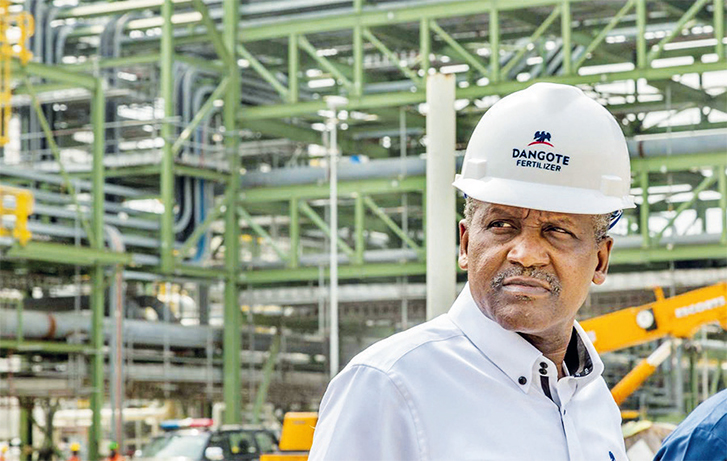How Dangote Refinery output will impact FX market, rising Inflation

Following the commencement of crude oil refining by Dangote Refinery, Nigeria is expected to witness calm in inflation and significant freeze pressure on foreign exchange market.
Dangote group had earlier announced that the 650,000 barrels per day facility has begun fuel production, potentially creating a new domestic market for Nigeria.
The $19 billion facility will produce diesel and jet fuel at the first instance, before progressing to producing Premium Motor Spirit (PMS) also called petrol, the Nigerian conglomerate said in a statement on January 12.
The refinery has so far received six million barrels of crude oil at its two SPMs located 25 km from the shore. The first crude delivery was done on December 12, 2023, and the sixth cargo was delivered on January 8, 2024.
The Chief Executive Officer, CEO, of the Center for The Promotion Of Private Enterprises, CPPE, Dr. Muda Yusuf, said the commencement of production operations by the Dangote Refinery would be a game changer for the petroleum downstream sector and the Nigerian economy and would further reduce inflationary rate.
According to the Nigerian Bureau of Statistics (NBS) Nigeria’s headline inflation rate had surged to 27.33 per cent in October and 28.2 percent in last year.
This is a 0.61 percentage point from the 26.72 per cent that was recorded in September.
In its Consumer Price Index (October 2023), the NBS stated that, “In October 2023, the headline inflation rate increased to 27.33 per cent relative to the September 2023 headline inflation rate which was 26.72 per cent.
“Looking at the movement, the October 2023 headline inflation rate showed an increase of 0.61 percentage points when compared to the September 2023 headline inflation rate.”
Major contributors to the increase in inflation were food and non-alcoholic beverages, housing, water, electricity gas and other fuel, clothing and footwear, transport, and furnishings and household equipment and maintenance.
In its recent forecast for the year, KPMG predicted that Nigeria’s headline inflation may rise to 30 per cent by December 2023 because of fuel subsidy removal, and the unification of the foreign exchange market.
The Headline inflation is the total inflation in an economy which includes commodities like food and energy.
Yusuf, however, said: ‘We expect a significant impact on supply of petroleum products and this should have an effect on prices.’
He, however, pointed out that, the degree of the effect on price will depend on adequacy and consistency of crude supply by the Nigerian National Petroleum Company Limited(NNPCL), as it will also depend on whether the crude will be sold to the refinery at global price and in dollars or in foriegn currency.
“If the NNPCL gives some concessions in crude pricing and ensures adequate and consistent supply, we should see a remarkable impact on diesel and aviation fuel prices, and subsequently the price of petrol,” he stressed.
This, he opined, would naturally ease the pressure of high energy prices on manufacturers and other investors in the economy, adding that the commencement of operations by the refinery also has some positive macroeconomic implications.
Yusuf, said particularly that the import substitution effects will reduce pressure on foreign exchange market and strengthen the currency in the medium to long-term and would have a knock on effect on inflation and capacity utilisation of domestic manufacturing firms.
He, however, added that, “the government needs to give the refinery [and others that are coming up] all the necessary support. Promoting Private investment in refineries is a strategic imperative to boost economic growth and stabilise the macroeconomic environment.”
Meanwhile, the Independent Petroleum Marketers Association of Nigeria(IPMAN), said it has not immediate supply demand from the refinery.
The association’s immediate past national president, Elder Chinedu Okoronkwo, said, though it is a cheering news that the refinery is about to commence full operations, the marketers body has a subsisting products supply agreement with the NNPCL.
“We are not engaging the refinery for products supply for now because we have a supply agreement with NNPCL, which has a shareholding interest in the refinery. So our agreement is still intact and we are receiving unhindered supplies and as such we do not have immediate need for a fresh engagement and more so we understand that the refinery has not even commenced refining of petrol” Okoronkwo who is now IPMAN BOT (Treasury) said.
Meanwhile, The Daily Times gathered that, key depot operators have not positioned their facilities in anticipation of products surge from the refinery, while major marketers and independent depot operators are reluctant to engage the refinery for products supply until physical loading commences from the gantry.
“Dangote Petroleum Refinery can meet 100% of Nigeria’s requirement of all refined products, gasoline, diesel, kerosene, and aviation jet, and also have surplus of each of these products for export,” the company added.
Last September, Dangote executive, Devakumar Edwin said, the refinery would start producing at 370,000 b/d before eventually ramping up to 650,000 b/d.
But S&P Global analysts predict the refinery will not hit full operating capacity until mid-2025.
Dangote had said previously that the refinery can load 2,900 trucks a day at its truck-loading gantries. The jet fuel from the refinery will conform to Euro V specifications. The facility was also designed to meet the World Bank, US EPA, European Union emission regulations and Nigeria’s regulatory authorities’ emission/effluent norms.
The company started test runs on the production units of the refinery last week, after receiving the final cargo of crude oil from NNPCL.
The project was officially completed in May but had yet to make any oil products due to a lack of domestic crude feedstock.
Culled from Daily Times Nigeria

